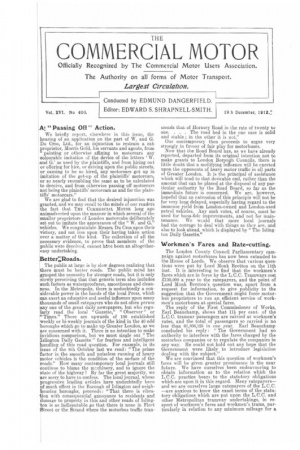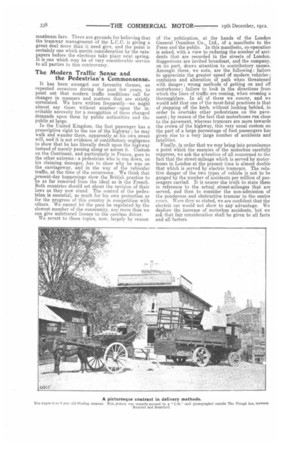At.1, "Passing Off" Action.
Page 1

Page 2

If you've noticed an error in this article please click here to report it so we can fix it.
We briefly report, elsewhere in this issue, the hearing of an application on the part of W. and G. Du Cros, Ltd., for an injunction to restrain a cab proprietor, Morris Gold, his servants and agents, from proprietor, or otherwise affixing to motorcars any
t olourable imitation of the device of the letters ' W. and G.' as used by the plaintiffs, and from hiring out or offering for hire, or driving upon the public streets, or causing to be so hired, any motorcars got up in imitation of the get-up of the plaintiffs' motorcars, or so nearly resembling the same as to be calculated to deceive, and from otherwise passing off motorcars not being the plaintiffs' motorcars as and for the plaintiffs' motorcars."
We are glad to find that the desired injunction was granted, and we may recall to the minds of our readers the fact that TEE COMMERCIAL MOT011 long ago animadverted upon the manner in which several of the smaller proprietors of London motorcabs deliberately set out to imitate the appearance of the "W. and G." vehicles. We congratulate Messrs, Du Cros upon their victory, and not less upon their having taken action over a matter of the kind. The collection of all the necessary evidence, to prove that members of the public were deceived, cannot hive been an altogethereasy undertaking.
Betteejloads.
The public at large is by slow degrees realizing that there must be better roads. The public mind has grasped the necessity for stronger roads, but it is only slowly perceiving that that generic term also includes such factors as waterproofness, smoothness and cleanness. In the Metropolis, there is undoubtedly a considerable power in the hands of the local Press, which Scan exert an educative and useful influence upon many thousands of small ratepayers who do not often peruse a.n.yr one of the great daily newspapers, but who regularly read the local " Gazette," "Observer" or ' Times." There are upwards of 100 established weekly or bi-weekly journals of the kind in the 40 odd [boroughs which go to make up Greater London, as we re concerned with it. There is no intention to make invidious comparison, but we must single out "The Islington Daily Gazette" for fearless and intelligent .handling of this road question. For example, in its *ssue of the 8th October last we read: "The prime actor in the smooth and noiseless running of heavy 'motor vehicles is the condition of the surface of the roads." How many contemporary local journals still i , ontinue to blame the machinery, and to ignore the
tate of the highway ? By far the great majority, we re sorry to have to confess. The local journal, whose progressive leading articles have undoubtedly been of much effect in the Borough of Islington and neighlbouring boroughs, proceeds : "That there is vibra-pion with consequential annoyance to residents and damage to property in this and other roads of Islington is as indisputable as that there is none in Fleet Street or the Strand Where the motorbus traffic tran scends that of Hornsey Road in the rate of twenty to one. . . . The road bed in the one case is solid and stable ; in the other it is not."
Our contemporary then proceeds to argue very strongly in favour of fair play for motorbuses. Now that the Road Board has, as we have already reported, departed from its original intention not to make grants to London Borough Councils, there is little doubt that a mollifying influence will be exerted upon the opponents of heavy motor traffic in all parts of Greater London. It is the principal of assistance which will tend to that desirable end, rather than the amount that can be placed at the disposal of any particular authority by the Road Board, so far as the immediate future is concerned, We are, however, hopeful that an extension of this principle will not be for very long delayed, especially having regard to the immense yield from London-owned and London-used petrol vehicles. Any such votes, of course, must be used for bona-fide improvements, and not for maintenance. We wt.uld that more kcal journals had the courage to deal with things as they are, and also to look ahead, which is displayed by " The Islington Daily Gazette."
Workmen's Fares and Rate-cutting.
The London County Council Parliamentary campaign against motorbuses has now been extended to the House of Lords. We observe that various questions were put by Lord Monk Bretton on the 11th inst. It is interesting to find that the workmen's fares which are in force by the L.C.C. Tramways cost 2130,000 a year to the ratepayers, and the point of Lord Monk Bretton's question was, apart from a request for information, to give publicity to the suggestion that the Government might force motorbus proprietors to run an efficient service of workmen's motorbuses at special fares.
The reply of the First Commissioner of Works, Earl Beauchamp, shows that 11i per cent. of the L.C.C. tramcar passengers are carried at workmen's rates, and the total of passengers so carried is no less than 61,806,125 in one year. Earl Beauchamp concluded his reply : " The Government had no authority to interfere with the fares charged by the motorbus companies or to regulate the companies in any way. He could not hold out any hope that the Government were likely to introduce legislation dealing with the subject." We are convinced that this question of workmen's fares will be given greater prominence in the near future. We have ourselves been endeavouring to obtain information as to the relation which the L.C.C. practice bears to the statutory obligations which are upon it in this regard. Many ratepayers— and we are ourselves large ratepayers of the L.C.C. —are anxious to know the exact terms of the statutory obligations which are put upon the L.C.O. and other Metropolitan tramway undertakings, in respect of workmen's fares and workmen's trams, particularly in relation to any minimum mileage for a
maximum fare. There are grounds for believing that the tramway management of the L.C.C. is giving a great deal more than it need give, and the point is certainly one which merits consideration by the ratepayers before the elections take place next spring. It is one which may be of very considerable service to all parties to this controversy.
The Modern Traffic Sense and the Pedestrian' s Commonsense.
It has been amongst our favourite themes, on repeated occasions during the past few years, to point out that modern traffic conditions call for changes in manners and matters that are strictly correlated. We have written frequently—we might almost say times without number—upon the inevitable necessity for a recognition of these changed demands upon them by public authorities and the public at large.
In the United Kingdom, the foot passenger has a prescriptive right to the use of the highway ; he may walk and wander there, apparently at his own sweet will and it is not evidence of contributory negligence to show that he has literally dwelt upon the highway instead of merely passing along or across it. Custom on the Continent, and particularly in France, goes to the other extreme : a pedestrian who is run down, on his claiming damages, has to show why he was on the carriageway, and in the way of the vehicular traffic, at the time of the occurrence. We think that present-day happenings show the British practice to *be as far removed from the ideal as is the French. Both countries should set about the revision of their laws as they now stand. The control of the pedestrian is essential, as much for his own protection as for the progress of this country in competition with others. We cannot let the pace be regulated by the slowest member of the community, any more than we can give unfettered licence to the careless driver.
We revert to these topics, now, largely by reason
of the publication, at the hands of the London General Omnibus Co., Ltd., of a manifesto to the Press and the public. In this manifesto, co-operation is asked, with a view to reducing the number of accidents that are recorded in the streets of London. Suggestions are invited broadcast, and the company, on its part. draws attention to contributory causes. Amongst these, we note, are the following : failure to appreciate the greater speed of modern vehicles ; confusion and alteration of path when threatened with danger ; wrong methods of getting on and off motorbuses ; failure to look in the directions from which the lines of traffic are coming, when crossing a thoroughfare. In all of these we concur, and we would add that one of the most-fatal practices is that of stepping off the kerb, without looking behind, in order to overtake other pedestrians on the pavement; by reason of the fact that motorbuses run. close to the pavement, whereas tramcars are more towards the crown of the highway, this very usual custom on the part of a large percentage of foot passengers has given rise to a very large number of accidents and fatalities.
Finally, in order that we may bring into prominence a point which the enemies of the motorbus carefully suppress, we ask the attention of all concerned to the fact that the street-mileage which is served by motorbuses in London at the present time is almost double that which is served by electric tramcars. The relative danger of the two types of vehicle is not to be gauged by the number of accidents per million of passengers carried. It is nearer the truth to state them in reference to the actual street-mileages that are served, and then to consider the non-admission of the ponderous and obstructive tramcar to the centre 7 nnes. Were they so stated, we are confident that the electric car would not show to any advantage. We deplore the increase of motorbus accidents, but we ask that fair consideration shall be given to all facts and all factors.




















